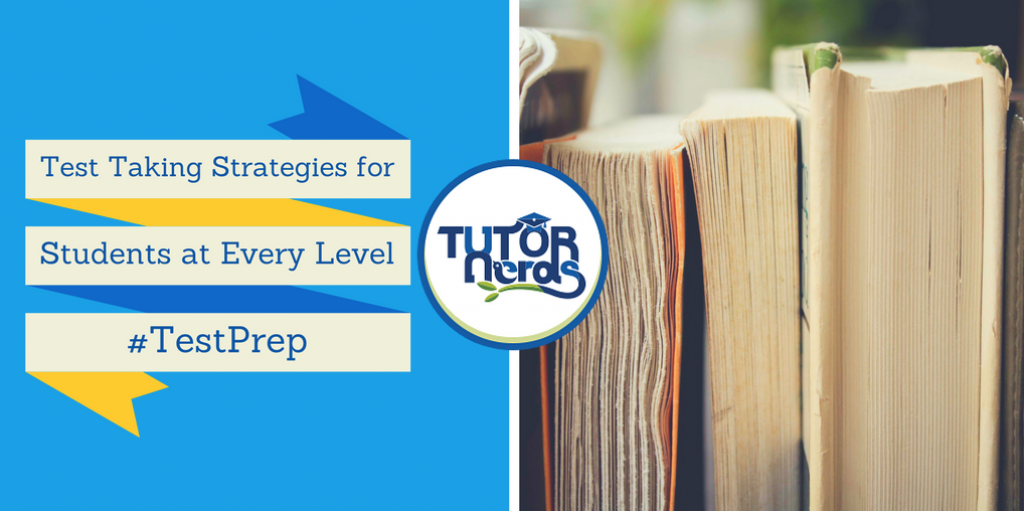Tips for Success: Test Taking Strategies for Students at Every Level



Let’s be honest; most students are not jumping for joy after receiving news about an upcoming quiz or test. One might instead hear the grumbling of an uneasy class and perhaps lay witness to several students dropping their heads to their desks in silent protest. Or maybe you’re the one with your head down. In any case, this is surely a current experience students, and all to come will endure more than once in their career. It is thus vital that one learns how to properly manage test-related anxiety and prepare like a pro, so that come test time, you will walk into the room with confidence and be ready to succeed in any situation – our private Irvine test prep tutors are here to help you succeed.
It is important to note: developing adept test-taking skills is not something one can accomplish overnight. However, do not panic. It is something that you can certainly learn by following a basic set of steps and procedures.
Below, I’ve attempted to break down test-taking strategies into three main categories of development: Preparation, Time Management, and Attitude. Though everyone’s approach to studying tends to be slightly different, I believe there is something in this article for everyone; and it can be, at the very least, a good place to start developing these essential skills.
Preparation
Once you know the date of your exam, it is important to begin thinking about how you will prepare. This includes getting organized and thinking long-term.
Getting organized is a great place to start. This involves gathering all class notes, homework, and relevant quizzes or tests that you might find helpful during study. Try creating a chronologically-ordered “study packet” so you can easily find important information when completing study guides or reviewing materials.
Note: for math exams, repetition of homework and example problems is critical. To maximize your efforts, one can make review sheets comprised of old homework/quiz/test/example problems from different topics on the same sheet – mix up the question types to simulate an actual test, which will often not have questions from the same section located close to one another.
Thinking long term is also essential in preparing. Though you do not have to begin studying right after you get the test date (it is likely you will not even have all the materials needed to study for the exam), it is essential to avoid procrastination. This means do not wait until the day before the exam to begin reviewing. Instead, start thinking about the relevant material at least several days before the test. In my experience, working through problems or reading notes about 2-3 days before the test date renders the best results.
Time Management
Time is a crucial element in any exam setting. Whether in preparation or during the actual test, your time management skills can make or break your experience and results.
In preparation, it is essential that you set aside the proper amount of time to study each day before your exam. Whether you need one hour or one hundred hours to study does not matter – what does is that you manage your time wisely to allow enough time for preparation. This means you might have to skip your favorite TV show occasionally, or perhaps leave practice, the gym, or any other extracurricular event a bit earlier than you normally would.
This skill is also crucial to master for use during the test as well. Confidently finishing all the problems within the time limit of the exam is obviously best-case scenario. But how do you achieve this? By understanding pacing. In a nutshell, knowing your strengths and weaknesses, and how quickly you can properly answer certain types of questions (whether it be short answers, multiple choice, or math problems) is important for this part. To properly pace, you should follow these three rules:
1. Do the easiest problems first.
2. Leave a difficult question if it is taking too long.
3. Go back to the harder questions and attempt them again, in order, once you have finished the others.
By following these three steps, you will be able to maximize a number of questions you can confidently finish on just about every type of test.
Attitude
The last and most important piece of advice I can offer is that your attitude will undoubtedly shape your performance and results. It is essential that you relax, remain persistent in your efforts as a student, and try to stay positive.
Do not forget to relax. Enter the exam setting with a smile and take a deep breath. After all, it’s just a test. I know I know, “it’s not just a test, this exam will determine my (insert life-threatening results here).” But the reality is, life will go on after you leave the classroom. That being said, always try your best – that’s what this guide is meant for anyway!
Persistence is one of the most important attributes to develop as a student because you will inevitably encounter at least one roadblock in your career. Whether it’s missing a homework assignment, not understanding the material during class, failing a test, or dropping a class, as I said before, your life will most certainly continue. The adage that tells us never to give up and try, try again could not be truer. Move forward, learn from your mistakes, and try to do better next time.
Always maintain a positive perspective on the situation. You can truly make yourself succeed or fail; a lot depends on your mindset before the exam. Believe in yourself, and your ability to succeed, and things will often go your way. You’ve got this.
This post was written by Jack McKay of TutorNerds.
100% Satisfaction Guarantee
You’ll love your tutor, or you don’t pay.

We will evaluate your situation and answer any questions. We will then individually match you with one of our tutors. Your tutor will recommend the best strategies for you based on your goals. You’ll work with the same tutor ongoing and you can schedule directly with your tutor.
100% Satisfaction Guarantee – You’ll love your tutor, or you don’t pay
| Cookie | Duration | Description |
|---|---|---|
| cookielawinfo-checkbox-analytics | 11 months | This cookie is set by GDPR Cookie Consent plugin. The cookie is used to store the user consent for the cookies in the category "Analytics". |
| cookielawinfo-checkbox-functional | 11 months | The cookie is set by GDPR cookie consent to record the user consent for the cookies in the category "Functional". |
| cookielawinfo-checkbox-necessary | 11 months | This cookie is set by GDPR Cookie Consent plugin. The cookies is used to store the user consent for the cookies in the category "Necessary". |
| cookielawinfo-checkbox-others | 11 months | This cookie is set by GDPR Cookie Consent plugin. The cookie is used to store the user consent for the cookies in the category "Other. |
| cookielawinfo-checkbox-performance | 11 months | This cookie is set by GDPR Cookie Consent plugin. The cookie is used to store the user consent for the cookies in the category "Performance". |
| viewed_cookie_policy | 11 months | The cookie is set by the GDPR Cookie Consent plugin and is used to store whether or not user has consented to the use of cookies. It does not store any personal data. |
